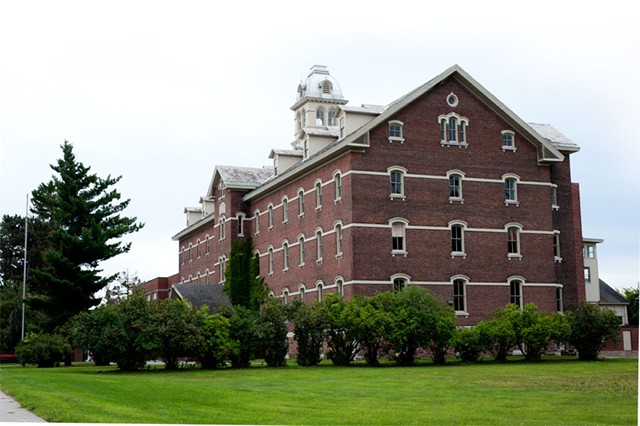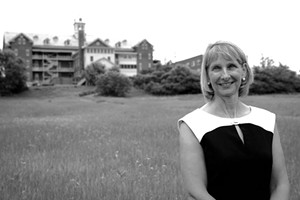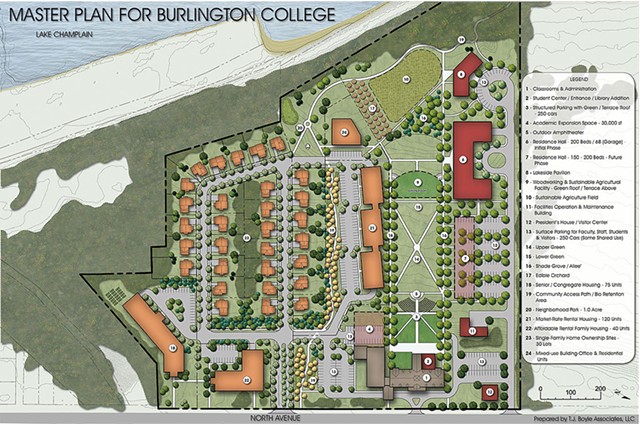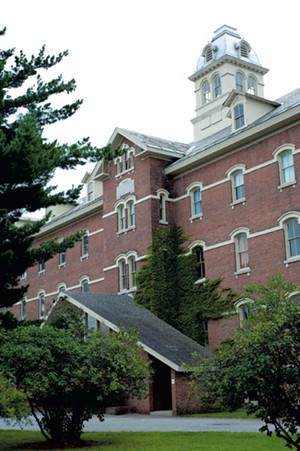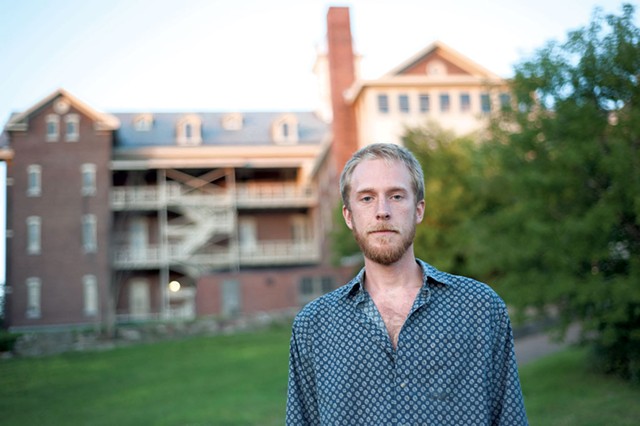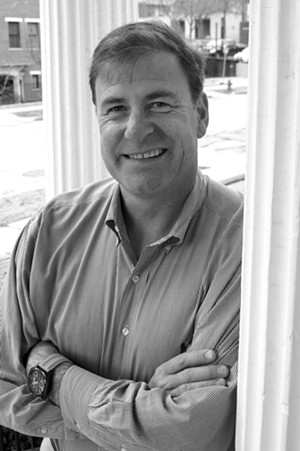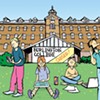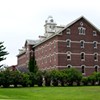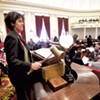Switch to the mobile version of this page.
Vermont's Independent Voice
- News
- Arts+Culture
- Home+Design
- Food
- Cannabis
- Music
- On Screen
- Events
- Jobs
- Obituaries
- Classifieds
- Personals
Browse News
Departments
Browse Arts + Culture
View All
local resources
Browse Food + Drink
View All
Browse Cannabis
View All
-
Business

Cannabis Company Could Lose License for Using…
-
Culture

'Cannasations' Podcaster Kris Brown Aims to 'Humanize'…
-
True 802

A Burlington Cannabis Shop Plans to Host…
-
Business

Judge Tosses Burlington Cannabiz Owner's Lawsuit
-
Health + Fitness

Vermont's Cannabis Nurse Hotline Answers Health Questions…
Browse Music
Browse On Screen
Browse Events
View All
Quick Links
Browse Classifieds
Browse Personals
-

If you're looking for "I Spys," dating or LTRs, this is your scene.
View Profiles
Special Reports
Pubs+More
Pass or Fail: What Happens If Burlington College Drops Out?
Published August 20, 2014 at 10:00 a.m. | Updated October 8, 2020 at 5:21 p.m.
A liberal arts education is a tough sell these days, at a time when students are hesitant to take out large loans and online learning offers a cheaper alternative. But Burlington College is up against an even greater challenge. In addition to proving its academic value, the lakeside college needs to convince students of something even more basic: that it won't fold before they graduate.
"Everybody is on eggshells," is how one professor sums up the mood since accreditors put the alternative school on probation this summer — a move that called attention to the precariousness of its financial situation. The New England Association of Schools and Colleges expressed concern that Burlington College had deficits for two years running and didn't appear to have enough cash on hand to make summer payroll. The most recent audit exposed chaotic bookkeeping practices, a tiny endowment being spent on operational costs, and lackluster fundraising efforts.
Adding urgency to the situation is the fact that Burlington College has defaulted on one of the loans that accounts for its $10 million debt, according to one of its creditors.
While President Christine Plunkett remains doggedly optimistic about the college's prospects, and the board of trustees claims to be 100 percent behind her, faculty, staff and students have taken a vote of "no confidence" in her leadership. The music program director, Michael Dabroski, resigned in July, and in the last few weeks, four staff members have called it quits: the dean, the director of financial aid, an admissions officer and the career services director.
Classes start next week, and the ailing institution is still advertising for students. If it doesn't get another 10 or so, it will need to revise — read, cut — an already lean budget, according to Plunkett. Meanwhile, accepted students have been withdrawing, and forfeiting their deposits, according to two of many Burlington College workers who spoke to Seven Days on condition of anonymity. Said one: "The melt has been ridiculous."
A 'Nontraditional' Beginning
Burlington College began in 1972, with 14 students meeting for class in the founder's living room.
From inception, it was a place for "nontraditional students" — Vietnam veterans, single parents, people seeking a highly personalized education.
According to the school's website, its founder and supporters "spent much of their time in the early years fighting to preserve what made the college special while striving to seek recognition as a legitimate member of the higher educational community."
Originally called the Vermont Institute of Community Involvement, the school won formal recognition — in the form of accreditation — in 1982.
Burlington College has grown, but, with fewer than 200 full-time students, class sizes remain small — 12 on average. Sandy Baird, a lawyer and community activist who's taught there since 1986, describes the typical student as someone looking for "a place where they have a lot of say in their learning who would prefer not to be in a larger, more impersonal university." At the start of each course, the student signs a contract with his or her professor, agreeing on what the requirements will be and whether or not grades will be involved.
click to enlarge 

- Courtesy of Burlington.edu
- Students read their No Confidence letter in a YouTube video
Students rave about the attention they get from professors. Film, integral psychology and social justice programs are especially popular. At graduation last May, students marched to the beat of taiko drumming instead of "Pomp and Circumstance."
Making do on a shoestring budget has also been a part of the college's identity since the beginning, and seniors recall, not unfondly, being crammed together at their old campus — a 30,000-square-foot former grocery store on North Avenue that is now the headquarters of the Committee on Temporary Shelter.
The building served Burlington College well — through the presidential tenures of Steward LaCasce, Daniel Casey and Mary Clancy. Former Burlington mayor Bernie Sanders had been in Congress for 13 years when his wife, Jane, landed the top job in 2004.
Jane Sanders led the college during the Great Recession — a time of studious belt-tightening for many schools. But Sanders took a different tack: She convinced the board of trustees the best way to preserve Burlington's most enigmatic institution of higher learning was to buy 32 acres of lakefront land from the Roman Catholic Diocese, including a behemoth brick building and a stone cottage, and create a real campus.
"I thought it was a very daring move," recalled Marc vanderHeyden, president of St. Michael's College from 1997 to 2007.
Daring, because the tiny college took on $10 million in debt — $6.5 million in tax-exempt bonds held by People's United Bank and a $3.5 million loan from the diocese, which sold the property to pay off settlements it owed as a result of lawsuits stemming from priest sexual abuse. Tony Pomerleau, the 97-year-old philanthropist who is Burlington's most senior developer, helped to broker the deal — and also contributed a $500,000 bridge loan.
The school's finances were relatively stable at the time of the real estate transaction. And Sanders predicted that a more spacious campus would attract hundreds of additional students, and she had plans for a $6 million capital campaign called "The Sky Is the Limit."
"Burlington College made a very good case. Jane Sanders ... was a very dynamic individual. I think she seemed to be in a position where she was poised to take the college to the next level," recalled Robert Giroux, executive director of the Vermont Educational and Health Buildings Finance Agency (VEHBFA), the state entity that supplied the tax-exempt bonds purchased by People's Bank.
The board based its decision, in part, on an outside firm's financial analysis, which noted that enrollment had increased 13 percent — from 142 full-time students in 2006 to 160 in 2010. During the same period, applications nearly tripled, from 78 to 207, and the tuition price went up. The Sanders administration projected continued growth — 20 percent annually until the college doubled in size.
To some, that prediction seemed starry-eyed, especially for such a tiny school. VanderHeyden remembers wondering how Burlington College could attract more students amid a trend of declining enrollment. "Even though I admired their nerve and their courage, I had to sometimes wonder because the kind of student they were drawing in was such a highly specialized niche."
Whether from increased enrollment or targeted fundraising, Sanders wasn't raising the money she was expected to, according to anonymous sources in news stories from the time. Under pressure from the board, she resigned in 2011, and Plunkett, her CFO, was selected to replace her. "A difference in vision" was the vague explanation offered for her departure.*
According to lawyer Baird, that's around the time the school started losing sight of its mission to build a "community that's just and humane and interested in creating beauty." Buying the diocese property wasn't necessarily a bad decision, in Baird's judgment, but "what happened was we took on this debt and then the emphasis became how to get out of the debt."
Plunkett's Problems
When she took over Burlington College, Plunkett inherited her predecessor's multi-million-dollar problem. The college's annual audits document a rocky transition. To get a look at those reports, Seven Days filed a public records request with VEHBFA, which receives the independent assessments as a condition of the loan it brokered for the bank.
Responding to a litany of problems identified in Burlington College's 2012 audit, Plunkett described her first year at the helm as "one of the most challenging in Burlington College's recent history." The college had agreed to pay Sanders roughly $200,000 over two years, Plunkett explained in a letter to the auditors, which depleted resources that would have been used to hire a new CFO. A number of people cycled through the business office, and bookkeeping suffered as a result. Staff departures adversely affected other departments too, and, Plunkett's letter continued, "Due to these transitions and staffing changes, there was little success with fundraising or enrollment growth during the year."
The new president concluded her response by reassuring auditors she had assembled a team that could turn things around.
One year later, the 2013 audit raised more alarms and expressed "substantial doubt" that the college could continue as a "going concern" — a business term meaning financially viable for at least a year. In her response to the 2013 audit, Plunkett again described it as "one of the most challenging years in memory at Burlington College with regard to financial oversight and reporting." Once again, she detailed the staff churn that contributed to the situation.
Asked to explain the chronic turnover during a phone interview Friday, Plunkett said, "When new leadership in an institution comes in and works with the board to set a vision for the college, typically there's a change ... When you combine that change in leadership with a financially stressed circumstance, these are hard environments to work in, and they are not for everyone."
More than half of the current employees have signaled they believe Plunkett is part of the problem. Sixteen of the 28 members of the Faculty and Staff Union took a vote of no confidence in her on July 21. Sixty-eight current students who make up the student union did the same.
In response, the board, which includes City Councilor Karen Paul, State Tourism Commissioner Megan Smith, Tom Torti, president of the Lake Champlain Regional Chamber of Commerce, and psychologist-physician Joel Miller, wrote back: "We note that the current administration inherited the economic profile of the College" — and asked faculty and staff to focus on academics and leave strategic decisions up to them.
At a place where questioning authority is part of the culture, that's unlikely to happen.
Current and former employees criticize what they describe as the administration's "scattershot" approach to recruiting students.
"It seemed like every day it shifted. We're going to go to all the tech schools and get those kids. Then, we are going to go to all the homeschool programs and get those kids," said one staff member. Plunkett and the outgoing dean, Stephen St. Onge, flew to China two years ago in a short-lived attempt to recruit foreign students.
Currently, the admissions office consists of two recent Burlington College graduates and a student doing work study; the college has been advertising for a director of admissions this summer. Last Friday, Plunkett acknowledged that office has lacked "solid leadership" over the past year.
There are concerns that in its desperation for more students, the school will dilute its identity and lose its niche. "They have this kind of warm-body policy where they take in anybody at this point," said David Littlefield, a current student who's helped spearhead the student union.
Another student observed, "I think in recent years we've been trying to appeal to every type of student ... I don't know if the administration understands that there's a very specific type of student the college is good for."
To that point, there's growing skepticism about whether the school has the resources to sustain the number of new programs that have sprouted up in recent years, many of which are dependent on individual professors, presumably to attract new students. Sanders added an individualized master's program, new majors including events and hospitality, international relations, integral psychology, and media activism, and various Cuba study-abroad programs. The college also built up a woodworking program in recent years, leasing space from a school run by Sanders' daughter at an annual cost that was $182,000 in 2013.
Under Plunkett's watch, the school started an Institute for Contemplative Studies, whose mission is to "create a container for introspective practice, scholarship, and community engagement." Plunkett still has plans to create a music program, despite Dabroski's departure and a preliminary rejection by NEASC, which noted that the school hadn't done market research to demonstrate that there is demand for such a degree.
Whose Default?
If Burlington College had met Sanders' "conservative" projections, it would currently have 280 full-time students. As of last Friday, roughly 180 were enrolled.
As a result, Burlington College has failed to maintain the cash reserves of almost $1.5 million that it's supposed to keep as part of its loan agreement with the diocese. Neither has it kept up an account required for the bank loan. The 2013 audit showed $8 in an account that should have roughly $400,000.
Under its agreements, the college needs to replenish those funds before it can start making interest payments to the diocese. In the meantime, the diocese is charging a penalty fee, which had reached $150,000 by June 2013 and which the school has not paid.
Plunkett disputes that the college is in default — "In our view default, technically, would be if you're supposed to be making a payment and you're not" — but she describes it as a "cordial disagreement."
"Again the diocese and the college have a very open dialogue going on this situation. We respectfully do not agree with one another."
Attempts to reach Reverend Daniel White and financial officer Martin Hoak at the diocese were unsuccessful.
Giroux, who had previously been unaware of the default situation, sent Plunkett an email on August 8 demanding more information. "I am very upset at the lack of notice and transparency regarding Burlington College's financial problems," he wrote. "Under our loan agreement, the Agency must be informed of any event of default."
There's a "cross default" provision in the loan agreement, according to Giroux, which means if the college defaults on the diocese's loan, it's automatically considered in default on the People's Bank loan.
A July 24 Seven Days story about Burlington College's finances prompted an email exchange among VEHBFA board members that was revealed as part of the public records request. Cathy Hilgendorf wrote to Giroux: "I am concerned as a VEHBFA board member: will there be bad press for the Financing Agency, could we have seen this coming, and would we have denied the bond application?"
"Making the decision using hindsight," Giroux responded to her. "I am guessing the board would not have approved the financing."
In a later interview, Giroux admitted the agency could end up "with egg on our face" for its decision to authorize the bonds, but he was confident the board made the right decision at the time.
The green light was contingent on the college lining up more than $2 million in committed donations. Plunkett recently told WCAX that she was surprised to discover that about half of that turned out to be a bequest, not a pledge. Bottom line, fundraising hasn't picked up on her watch, according to the audits. Much of the main building, an imposing brick Victorian that was once an orphanage, remains shuttered and uninhabitable — evidence of a capital campaign that hasn't gotten off the ground.
Yves Bradley, the board chair and a vice president at Pomerleau Real Estate, did not return multiple calls requesting an interview, but in July, he told Seven Days that Burlington College had put its fundraising plans on hold. The school needs to convince potential benefactors it can survive before asking them to open their checkbooks, he explained.
Burlington College doesn't seem to have the same reservations about students, though. "We have, I believe, enrolled three or four students just in the last day or two," Plunkett said on Friday.
Recent withdrawals suggest not all of the students are buying it. "I can't look a student in the eye and say, 'Yeah, you should come here,'" said one student.
"Seeing new students come into the school and seeing them on their admissions tours is just heart-wrenching," current student Littlefield said. "It's just hard to watch them going through the halls and hearing all stuff that I was promised a few years ago."
Plunkett is replenishing the admissions office by hiring several outside consultants with "expertise in turnaround enrollment situations."
And the embattled president has assigned another consultant — Bill McGarry, who's also advising her on the development deal — to help improve her rapport with faculty and staff. "I'm looking forward to working to mending relations," Plunkett said. "It is a difficult time and it's a stressful time, but I remain so committed to this institution."
Real Estate 101
Last October, Plunkett unveiled a development proposal that, if realized, would reduce the college's debt by about half. Burlington College would sell some land to developer Eric Farrell, who would construct several hundred units of housing, in addition to an expansion of the college campus.
Farrell has declined to go into any detail about the status of their agreement. "I don't think it's particularly useful or helpful to comment further on the plan. The only thing I would say is we are on track," he said early last week.
Asked specifically whether the potential default complicates the plan, Farrell responded, "I don't believe everything I read in the paper."
The plan is complicated by the fact that Burlington College purchased much of the land with tax-exempt bonds, which can't be transferred to a private developer without becoming taxable.
Plunkett expects to sign an agreement with Farrell in September but she said Friday that they won't close on the sale until 2016, at the earliest.
Baird wonders whether that's soon enough to save the school. "I'm not sure it can get us out of trouble in the time period we need." She has a different idea about what the school needs to do to survive. "I think if we had a plan that would appeal more to the community, then we could really fundraise." The longtime legal professor thinks people would rally to preserve, rather than develop, the lakefront land.
Pomerleau was even more blunt about Plunkett's development plan. "I don't think it's going to happen," he said Monday, pointing out, "It takes an awful lot of time to develop it."
What happens to the property — the last significant swath of open space in the city — if the school folds?
People's United Bank holds a first mortgage on the campus, and the diocese has a second mortgage.
Bill Kiendl founded Vermont Commercial Real Estate and has a specialty in foreclosures. Banks typically aren't interested in owning property, Kiendl explained, so even when a debtor has fallen behind in payments, "I think the bank's position is always to try to work out something with current ownership before they have to foreclose."
If that fails, the lender would almost certainly seize the property and sell it off. After People's recoups its money, the diocese would likely be entitled to the leftover proceeds in order to replace its loan.
Pomerleau declined to say what the collateral is on his loan, but he makes it clear that he pitched in because he thought Sanders was "doing an exceptional job." The current administration has made "some interest payments," he said. Pomerleau pushed back the due date for the principal payment by a year, and he's prepared to do that again. "I know they won't be able to pay me this December, so I'll just give them another year."
Beyond that, Pomerleau said, he intends to stay out of the fray. "I would hate to see it go down," but, he added, "I don't want to get involved." When the diocese still owned the property, Pomerleau was, at one point, considering purchasing and developing part of the land, but the deal "didn't work out financially." Would he be interested again if the bank foreclosed? "No," Pomerleau said. "It would be millions of dollars. I've got the money to do it, but I've got so many projects across the state ... I'm in a good position to stand by." If his son and business partner, Ernie, were interested, the elder Pomerleau said, he'd advise against it.
Littlefield thinks foreclosure could be around the corner. "I think there is very little hope for the institution to survive in the future, and by the future I mean within the next few semesters." The Maine native isn't too worried about his personal academic experience — he is one semester away from a bachelor's degree in film production. But for other students, "I have grave concerns about what their education will look like in the coming semesters," he says.
A teal-colored felt circle was safety-pinned to Littlefield's shirt. Along with other student union members, he's taken to wearing it as a tribute to the college's old building, which is painted the same color.
When Burlington College sold that property and moved a half mile north into its lakeside digs, it was supposed to be the start of something transformational. But Littlefield remembers it as the start of when "the school began to crumble." Four years later, his nostalgia for the cramped quarters the college left behind illustrates just how far off that vision remains.
The original print version of this article was headlined "Pass or Fail"
*Correction 07/20/14: An earlier version of this story stated that Jane Sanders resigned as president of Burlington College in 2012; it was, in fact, 2011.
Related Stories
Got something to say?
Send a letter to the editor
and we'll publish your feedback in print!
More By This Author
About The Author

Alicia Freese
Bio:
Alicia Freese was a Seven Days staff writer from 2014 through 2018.
Alicia Freese was a Seven Days staff writer from 2014 through 2018.
About the Artist

Matthew Thorsen
Bio:
Matthew Thorsen was a photographer for Seven Days 1995-2018. Read all about his life and work here.
Matthew Thorsen was a photographer for Seven Days 1995-2018. Read all about his life and work here.
Speaking of...
-

Lt. Gov. Zuckerman Goes on a 'Banned Books Tour'
Sep 6, 2023 -

UVM Hillel Provides Shabbat Meal Kits With Student-Grown Vegetables
Aug 29, 2023 -

Heather Moore, New Executive Director of Shelburne Craft School, Is Learning on the Job
Aug 31, 2022 -

Vermont Officials Release Relaxed COVID-19 Guidance for the School Year
Aug 24, 2022 -

Mr. Fix-It: Marty Spaulding Works Behind the Scenes to Help Students Learn on Campus
Aug 24, 2021 - More »
Comments (2)
Showing 1-2 of 2
Comments are closed.
From 2014-2020, Seven Days allowed readers to comment on all stories posted on our website. While we've appreciated the suggestions and insights, right now Seven Days is prioritizing our core mission — producing high-quality, responsible local journalism — over moderating online debates between readers.
To criticize, correct or praise our reporting, please send us a letter to the editor or send us a tip. We’ll check it out and report the results.
Online comments may return when we have better tech tools for managing them. Thanks for reading.
- 1. Neighbor Charged With Murdering 82-Year-Old Enosburg Woman Crime
- 2. A Farting Bear Caught on Camera Is What We All Needed to See True 802
- 3. Rita Mannebach Traveled From Florida to Vermont to Choose How She Died Health Care
- 4. Immigration Officials Illegally Deported Vermont Family, Advocates Say News
- 5. An Inmate’s Pleas About Her Dangerous Cellmate Were Dismissed. Then She Was Attacked. Crime
- 6. Vermont Farmers Experience a Second Devastating Summer of Flooding Environment
- 7. Some Residents Flooded Out of Plainfield Think Goddard’s Campus Should Become Home Economy
- 1. A Farting Bear Caught on Camera Is What We All Needed to See True 802
- 2. Rita Mannebach Traveled From Florida to Vermont to Choose How She Died Health Care
- 3. Moving on From Its Industrial Past, St. Johnsbury Is Attracting Young Entrepreneurs and Building a Vibrant Downtown Economy
- 4. Heavy Rains Hit Vermont Again as Flooding Washes Out Roads News
- 5. Neighbors Band Together to Save Cattle From Hinesburg Floodwater Environment
- 6. Vermont Health Officials Prepare for Bird Flu as It Spreads in Dairy Herds News
- 7. Vermont's 'Orwellian' Butter Gets a Shout-Out in Hit Show 'The Bear' True 802


























